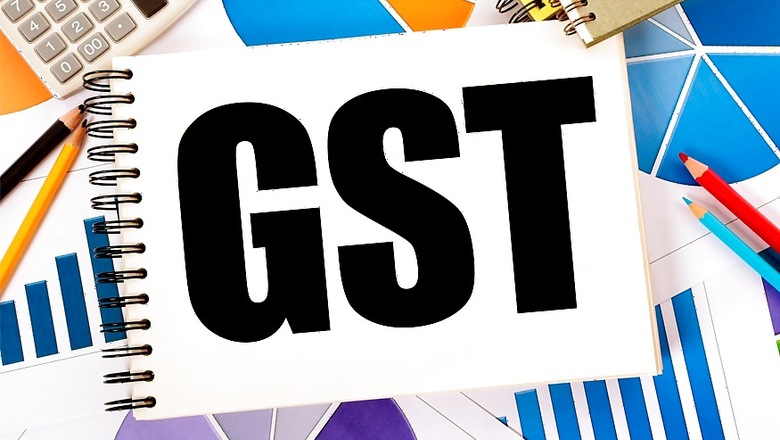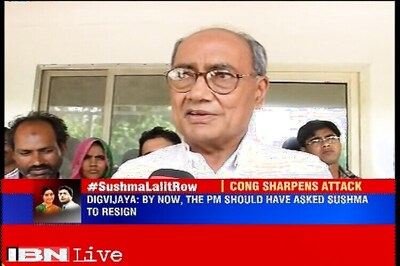
views
The Centre has released Rs 15,340 crore GST compensation to the states and Union territories so far in the current fiscal, despite an insignificant revenue mop up from goods and services tax owing to the nationwide lockdown, according to sources.
For 2019-20 fiscal (up to November 2019), the Centre has released Rs 1,20,498 crore GST compensation, higher than Rs 69,275 crore released in full 2018-19 and Rs 41,146 crore in 2017-18. GST was rolled out on July 1, 2017.
The cess collection in 2019-20, 2018-19 and 2017-18 fiscal was Rs 95,000 crore, Rs 95,081 crore and Rs 62,611 crore, respectively.
As the compensation requirement of the states was less than collection in the first two years (2017-18 and 2018-19) of GST rollout, Rs 47,271 crore GST cess collected had remained unutilised in the compensation kitty.
Finance Ministry sources said since the end of August 2019, the central government has started realising the impending precarious position in paying GST compensation to the states and UTs as the compensation cess requirement was being double of the average monthly cess collection.
"On an average the monthly GST compensation cess requirement was to the tune of Rs 14,000 crore while the cess collection average was only in the range of Rs 7,000 to Rs 8,000 crore per month," a source said.
In the current fiscal year, the central government has released Rs 15,340 crore to the states and UTs as GST compensation despite an almost insignificant collection practically due to relief provided in terms of filing of return and payment of taxes owing to the lockdown caused by the outbreak of COVID-19 pandemic, the source added.
With dwindling cess kitty, the options left with the GST Council were to either bring more items under the cess base by expanding the base of GST cess items or to increase cess rate on the existing items.
"Any increase in compensation cess on few items could only yield about Rs 2,000-3,000 crore a year. Therefore, the other options left were to either forego full cess compensation which was increasing at the rate 14 per cent per annum or to go ahead with whatever compensation is available. One more option was to raise the tax rate on items by rationalisation of rates by shuffling slab rates," another source said.
For 2019-20 fiscal, despite lower GST revenue collection, the Centre has cleared compensation till November, 2019, without any discrimination between states. For the period of December 2019-March 2020, GST compensation payout is due.
Compensation is released on a pro-rata basis uniformly for all states without discriminating among them, a source said, adding the calculation of compensation is done in transparent manner and is shared with the states.
Under GST law, states were guaranteed to be paid for any loss of revenue in the first five years of the GST implementation from July 1, 2017. The shortfall is calculated assuming a 14 per cent annual growth in GST collections by states over the base year of 2015-16.
Under the GST structure, taxes are levied under 5, 12, 18 and 28 per cent slabs. On top of the highest tax slab, a cess is levied on luxury, sin and demerit goods and the proceeds from the same are used to compensate states for any revenue loss.
The GST Council had earlier received suggestions from states for payment of compensation from the Consolidated Fund of India or through borrowings from the market.
In 7th meeting of the GST Council held on December 22-23, 2016, the erstwhile Finance Minister and the then Chairman of the GST Council, Arun Jaitley noted that, "...the demand for payment of compensation from the Consolidated Fund of India essentially meant funding compensation from Income Tax or non-tax revenues of the Central Government, which would be a challenge as the Central Government also had its own committed expenditure.
"...based on these considerations, certain principles had been agreed upon, namely that the compensation would be funded out of the cess mechanism, which would have a pool of revenue and if there was any shortfall in this pool, it could be supplemented by some mechanism that the Council might decide."
On a point raised by the then Finance Minister of Telangana that "the Council had not decided as to how compensation would be paid if there was a shortfall in cess collection", the then Chairperson had stated that "in such an eventuality, the Council could decide to raise the rate of tax or cess".
In response to the remark of erstwhile Tamil Nadu Minister that, "cess should not become a cross around the Council's neck" and his suggestion "to have a formulation if cess was found to be inadequate, the Council shall arrive at ways to meet the shortfall", the then Chairperson observed that "there was Constitutional commitment for the Central Government to provide hundred per cent compensation and how it would be done was for the Council to decide".
During the 8th meeting of the Council, Jaitley had assured that "compensation to States shall be paid for 5 years in full within the stipulated period of 5 years and, in case the amount in the GST Compensation Fund fell short of the compensation payable, the GST Council shall decide the mode of raising additional resources including borrowing from the market which could be repaid by collection of cess in the sixth year or further subsequent years".
In the 39th GST council meeting on March 14, 2020, Finance Minister Nirmala Sitharaman had said that Centre will look into the legality of GST Council borrowing from market to meet the compensation requirements under the Goods and Services Tax. With states raising the issue of shortfall in compensation kitty, there were discussions on resorting to market borrowing to meet the revenue guarantee to states.




















Comments
0 comment